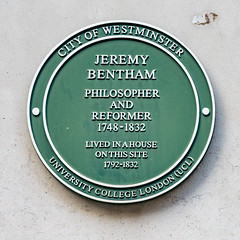Jeremy Bentham
Commemorated on 2 plaques
Jeremy Bentham philosopher and reformer 1748-1832 lived in a house on this site
50 Queen Anne's Gate, London, United Kingdom where they lived
JEREMY BENTHAM Known for many years as the 'Lord Wellington' it is still frequently referred to as the 'Welly Bar' by many of the academics and local residents. Renamed in October 1982 to commemorate the 150th anniversary of the death of Jeremy Bentham who is recognised as the spiritual founder of University College London. The myth that he was the founder is sustained in a bizarre manner by the college. His 'Auto-Icon' as he called it, is in fact his skeleton, dressed in his own clothes and topped with a wax model of his head. His actual head is mummified and kept in the college vaults. It is brought out for meetings of the college council and he is recorded as being present but not voting. Above the bar can be seen a copy of the wax head, made by students at the college In renaming the pub after him we are reminded of his greatest ideal, "The greatest happiness of the greatest numbers." "A GREAT MAN HAS GONE FROM AMONG US, FULL OF YEARS OF GOOD WORKS AND OF DESERVED HONOURS IN THE HIGHEST DEPARTMENTS IN WHICH THE HUMAN INTELLECT CAN EXERT ITSELF. HE HAS NOT LEFT HIS EQUAL OR HIS SECOND BEHIND HIM"
31 University Street, London, United Kingdom where they was



